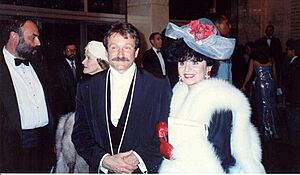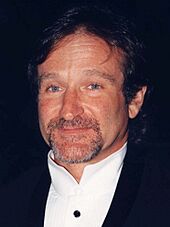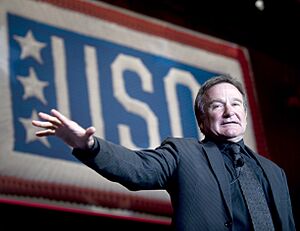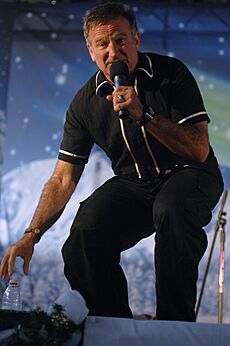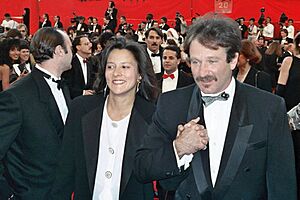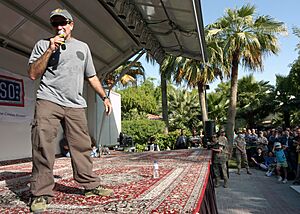Robin Williams facts for kids
Quick facts for kids
Robin Williams
|
|
|---|---|
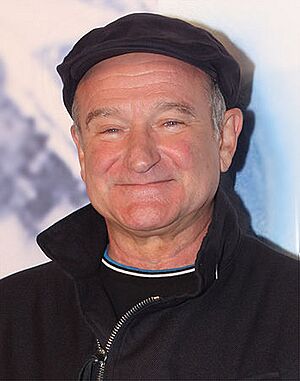
Williams in 2011
|
|
| Born |
Robin McLaurin Williams
July 21, 1951 Chicago, Illinois, U.S.
|
| Died | August 11, 2014 (aged 63) Paradise Cay, California, U.S.
|
| Education |
|
| Occupation |
|
| Years active | 1976–2014 |
|
Works
|
Full list |
| Spouse(s) |
Valerie Velardi
(m. 1978; div. 1988)Marsha Garces
(m. 1989; div. 2010)Susan Schneider
(m. 2011) |
| Children | 3, including Zelda |
| Comedy career | |
| Medium |
|
| Genres |
|
Robin McLaurin Williams (July 21, 1951 – August 11, 2014) was an American actor and comedian. Known for his improvisational skills and the wide variety of characters he created on the spur of the moment and portrayed on film, in dramas and comedies alike, he is regarded as one of the greatest comedians of all time. He received numerous accolades including an Academy Award, two Primetime Emmy Awards, six Golden Globe Awards, five Grammy Awards, and two Screen Actors Guild Awards. He was awarded the Cecil B. DeMille Award in 2005.
Williams began performing stand-up comedy in San Francisco and Los Angeles during the mid-1970s, and released several comedy albums including Reality ... What a Concept in 1980. He rose to fame playing the alien Mork in the ABC sitcom Mork & Mindy (1978–1982). He received his first leading film role in Popeye (1980). Williams won the Academy Award for Best Supporting Actor for Good Will Hunting (1997). His other Oscar-nominated roles were for Good Morning, Vietnam (1987), Dead Poets Society (1989) and The Fisher King (1991).
Williams starred in the critically acclaimed dramas The World According to Garp (1982), Moscow on the Hudson (1984), Awakenings (1990), Insomnia (2002), One Hour Photo (2002) and World's Greatest Dad (2009). He also starred in Toys (1992), The Birdcage (1996) and Patch Adams (1998), as well as family films, such as Hook (1991), Mrs. Doubtfire (1993), Jumanji (1995), Jack (1996), Flubber (1997), RV (2006) and the Night at the Museum trilogy (2006–2014). He lent his voice to the animated films Aladdin (1992), Robots (2005), Happy Feet (2006) and its 2011 sequel.
Contents
Early life and education
Robin McLaurin Williams was born at St. Luke's Hospital in Chicago, Illinois, on July 21, 1951. His father, Robert Fitzgerald Williams (1906–1987), was a senior executive in Ford's Lincoln-Mercury Division. His mother, Laurie McLaurin (1922–2001), was a former model from Jackson, Mississippi, whose great-grandfather was Mississippi senator and governor Anselm J. McLaurin. Williams had two older half-brothers: a paternal half-brother, Robert (also known as Todd), and a maternal half-brother, McLaurin. While his mother was a practitioner of Christian Science, Williams was raised in his father's Episcopal faith. During a television interview on Inside the Actors Studio in 2001, Williams credited his mother as an important early influence on his humor, and he tried to make her laugh to gain attention.
Williams attended public elementary school in Lake Forest at Gorton Elementary School and middle school at Deer Path Junior High School. He described himself as a quiet child who did not overcome his shyness until he became involved with his high school drama department. His friends recall him as very funny. In late 1963, when Williams was 12, his father was transferred to Detroit. The family lived in a 40-room farmhouse on 20 acres (8 ha) in suburban Bloomfield Hills, Michigan, where he was a student at the private Detroit Country Day School. He excelled in school, where he was on the school's wrestling team and was elected class president.
As both his parents worked, Williams was partially raised by the family's maid, who was his main companion. When he was 16, his father took early retirement and the family moved to Tiburon, California. Following their move, Williams attended Redwood High School in nearby Larkspur. At the time of his graduation in 1969, he was voted "Most Likely Not to Succeed" and "Funniest" by his classmates. After high school graduation, Williams enrolled at Claremont Men's College in Claremont, California, to study political science; he dropped out to pursue acting. Williams studied theater for three years at the College of Marin, a community college in Kentfield, California. According to the College of Marin's drama professor, James Dunn, the depth of the young actor's talent became evident when he was cast in the musical Oliver! as Fagin. Williams often improvised during his time in the drama program, leaving cast members in hysterics. Dunn called his wife after one late rehearsal to tell her Williams "was going to be something special".
In 1973, Williams attained a full scholarship to the Juilliard School (Group 6, 1973–1976) in New York City. He was one of 20 students accepted into the freshman class, and he and Christopher Reeve were the only two accepted by John Houseman into the Advanced Program at the school that year. William Hurt and Mandy Patinkin were also classmates. According to biographer Jean Dorsinville, Franklyn Seales and Williams were roommates at Juilliard. Reeve remembered his first impression of Williams when they were new students at Juilliard: "He wore tie-dyed shirts with tracksuit bottoms and talked a mile a minute. I'd never seen so much energy contained in one person. He was like an untied balloon that had been inflated and immediately released. I watched in awe as he virtually caromed off the walls of the classrooms and hallways. To say that he was 'on' would be a major understatement."
Williams and Reeve had a class in dialects taught by Edith Skinner, who Reeve said was one of the world's leading voice and speech teachers; according to Reeve, Skinner was bewildered by Williams and his ability to instantly perform in many different accents. Their primary acting teacher was Michael Kahn, who was "equally baffled by this human dynamo". Williams already had a reputation for being funny, but Kahn criticized his antics as simple stand-up comedy. In a later production, Williams silenced his critics with his well-received performance as an old man in Tennessee Williams's Night of the Iguana. Reeve wrote, "He simply was the old man. I was astonished by his work and very grateful that fate had thrown us together." The two remained close friends until Reeve's death in 2004. Their friendship was like "brothers from another mother", according to Williams's son Zak.
During the summers of 1974, 1975, and 1976, Williams worked as a busboy at The Trident in Sausalito, California. He left Juilliard during his junior year in 1976 at the suggestion of Houseman, who said there was nothing more Juilliard could teach him. Gerald Freedman, another of his teachers at Juilliard, said Williams was a "genius" and that the school's conservative and classical style of training did not suit him; no one was surprised that he left.
Career
1976–1983: Stand-up comedy and Mork and Mindy
Williams began performing stand-up comedy in the San Francisco Bay Area in 1976. He gave his first performance at the Holy City Zoo, a comedy club in San Francisco. Williams moved to Los Angeles and continued performing stand-up at clubs, including The Comedy Store. There, in 1977, he was seen by TV producer George Schlatter, who asked him to appear on a revival of his show Laugh-In. The show aired in late 1977 and was his debut TV appearance. That year, Williams also performed a show at the L.A. Improv for Home Box Office. Although the Laugh-In revival failed, it led Williams to his television career; he continued performing stand-up at comedy clubs such as the Roxy to help keep his improvisational skills sharp. In England, Williams performed at The Fighting Cocks.
The first film role credited to Williams was a small part in the 1977 low-budget comedy Can I Do It... 'Til I Need Glasses?. His first starring performance, however, was as the title character in Popeye (1980), in which Williams showcased the acting skills previously demonstrated in his television work. Accordingly, the film's commercial disappointment was not blamed on his performance.
Mork and Mindy
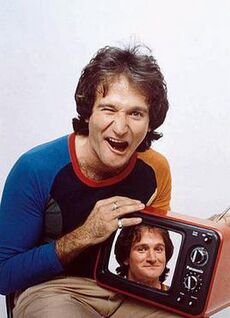
After the Laugh-In revival, and appearing in the cast of The Richard Pryor Show on NBC, Williams was cast by Garry Marshall as the alien, Mork, in a 1978 episode of the TV series, Happy Days, titled "My Favorite Orkan". Sought after as a last-minute cast replacement for a departing actor, Williams impressed the producer with his quirky sense of humor when he sat on his head when asked to take a seat for the audition. As Mork, Williams improvised much of his dialogue and physical comedy, speaking in a high, nasal voice, and he made the most of the script. The cast and crew, as well as TV network executives, were deeply impressed with his performance. As such, the executives moved quickly to get the performer on contract just four days later before competitors could make their own offers.
Mork's appearance proved so popular with viewers that it led to the spin-off television sitcom Mork & Mindy, which co-starred Pam Dawber, and ran from 1978 to 1982; the show was written to accommodate his extreme improvisations in dialogue and behavior. Although he portrayed the same character as in Happy Days, the series was set in the present in Boulder, Colorado, instead of the late 1950s in Milwaukee. Mork & Mindy at its peak had a weekly audience of sixty million and was credited with turning Williams into a "superstar". Among young people, the show was very popular because Williams became "a man and a child, buoyant, rubber-faced, an endless gusher of ideas," according to critic James Poniewozik.
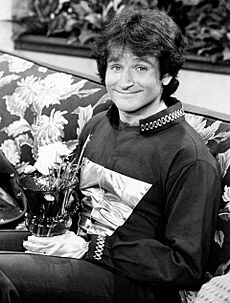
Mork became popular, featured on posters, coloring books, lunch-boxes, and other merchandise. Mork & Mindy was such a success in its first season that Williams appeared on the March 12, 1979, cover of Time magazine. The cover photo, taken by Michael Dressler in 1979, is said to have "[captured] his different sides: the funnyman mugging for the camera, and a sweet, more thoughtful pose that appears on a small TV he holds in his hands" according to Mary Forgione of the Los Angeles Times. This photo was installed in the National Portrait Gallery in the Smithsonian Institution shortly after his death to allow visitors to pay their respects. Williams also appeared on the cover of the August 23, 1979, issue of Rolling Stone, photographed by Richard Avedon.
With his success on Mork & Mindy, Williams began to reach a wider audience with his stand-up comedy, starting in the late 1970s and throughout the 1980s, including three HBO comedy specials: Off The Wall (1978), An Evening with Robin Williams (1983), and A Night at the Met (1986). Williams won a Grammy Award for Best Comedy Album for the recording of his 1979 live show at the Copacabana in New York City, Reality ... What a Concept.
1982–1999: Film stardom and acclaim
Williams starred as the lead character in The World According to Garp (1982), which Williams noted "may have lacked a certain madness onscreen, but it had a great core". Critic Roger Ebert wrote of his performance, "Although Robin Williams plays Garp as a relatively plausible, sometimes ordinary person, the movie never seems bothered by the jarring contrast between his cheerful pluckiness and the anarchy around him." He continued with other smaller roles in less successful films, such as The Survivors (1983) and Club Paradise (1986), although he said these roles did not help advance his film career.
In 1986, Williams co-hosted the 58th Academy Awards. The following year, he appeared in a sketch comedy special Carol, Carl, Whoopi and Robin (1987), acting alongside Carol Burnett, Carl Reiner and Whoopi Goldberg. Williams was also a regular guest on various talk shows, including The Tonight Show Starring Johnny Carson and Late Night with David Letterman, on which he appeared 50 times. His first major break came from his starring role in director Barry Levinson's Good Morning, Vietnam (1987), which earned Williams a nomination for the Academy Award for Best Actor. The film is set in 1965 during the Vietnam War, with Williams playing the role of Adrian Cronauer, a radio shock jock who keeps troops entertained with comedy and sarcasm. Williams was allowed to play the role without a script, improvising most of his lines. Over the microphone, he created voice impressions of various people, including Walter Cronkite, Gomer Pyle, Elvis Presley, Mr. Ed and Richard Nixon. "We just let the cameras roll", said producer Mark Johnson, and Williams "managed to create something new for every single take".
Williams appeared opposite Steve Martin at Lincoln Center in an off-Broadway production of Waiting for Godot in 1988. Many of his subsequent roles were in comedies tinged with pathos, such as Mrs. Doubtfire (1993) and Patch Adams (1998). Looking over most of his filmography, one writer was "struck by the breadth" and radical diversity of most of the roles Williams portrayed. In 1989, Williams played a private-school English teacher in Dead Poets Society, which included a final, emotional scene that some critics said "inspired a generation" and became a part of pop culture. Similarly, his performance as a therapist in Good Will Hunting (1997) deeply affected even some real therapists. In Awakenings (1990), Williams plays a doctor modeled after Oliver Sacks, who wrote the book on which the film is based. Sacks later said the way the actor's mind worked was a "form of genius". In 1991, he played an adult Peter Pan in the film Hook, although he had said he would have to lose 25 pounds for the role. Terry Gilliam, who directed Williams in two of his films, The Fisher King (1991) and The Adventures of Baron Munchausen (1988), said in 1992 that Williams had the ability to "go from manic to mad to tender and vulnerable ... [Williams had] the most unique mind on the planet. There's nobody like him out there."
While Williams voiced characters in several animated films, his voice role as the Genie in the animated musical, Aladdin (1992), was written for him. The film's directors said that they had taken a risk by writing the role. At first, Williams refused the role since it was a Disney movie, and he did not want the studio profiting by selling merchandise based on the movie. He accepted the role with certain conditions: "I'm doing it basically because I want to be part of this animation tradition. I want something for my children. One deal is, I just don't want to sell anything—as in Burger King, as in toys, as in stuff." Williams improvised much of his dialogue, recording approximately 30 hours of tape, and impersonated dozens of celebrities, including Ed Sullivan, Jack Nicholson, Robert De Niro, Groucho Marx, Rodney Dangerfield, William F. Buckley Jr., Peter Lorre, Arnold Schwarzenegger and Arsenio Hall. His role in Aladdin became one of his most recognized and best-loved, and the film was the highest-grossing of 1992; it won numerous awards, including a Special Golden Globe Award for Vocal Work in a Motion Picture for Williams. His performance paved the way for other animated films to incorporate actors with more star power. He was named a Disney Legend in 2009.
Due to Disney breaking an agreement with Williams regarding the use of the Genie in the advertising for Aladdin, Williams refused to sign for the direct-to-video sequel, The Return of Jafar (1994); the Genie was instead voiced by Dan Castellaneta. When Jeffrey Katzenberg was replaced by Joe Roth as Walt Disney Studios chairman, Roth organized a public apology to Williams. Williams would, in turn, reprise the role in the second sequel, Aladdin and the King of Thieves (1996). During this time, he lent his voice to FernGully: The Last Rainforest (1992). Other dramatic performances by Williams include Moscow on the Hudson (1984), What Dreams May Come (1998) and Bicentennial Man (1999). During the early 2000s, Williams demonstrated a new rank of his versatility by playing darker roles than he had in the previous decades. Williams appeared with fellow comedian, Billy Crystal, in an unscripted cameo at the beginning of a 1997 episode of the third season of Friends.
Williams's performances garnered various accolades, including an Academy Award for Best Supporting Actor for his performance in Good Will Hunting; as well as two previous Academy Award nominations, for Dead Poets Society, and as a troubled homeless man in The Fisher King, respectively. Among the actors who helped him during his acting career, he credited Robert De Niro, from whom he learned the power of silence and economy of dialogue when acting. From Dustin Hoffman, with whom he co-starred in Hook, he learned to take on totally different character types, and to transform his characters by extreme preparation. Mike Medavoy, producer of Hook, told its director, Steven Spielberg, that he intentionally teamed up Hoffman and Williams for the film because he knew they wanted to work together, and that Williams welcomed the opportunity of working with Spielberg. Having Woody Allen, who directed him and Billy Crystal in Deconstructing Harry (1997), helped Williams. Allen knew that Crystal and Williams had often worked together on stage.
2000–2014: Children's films and return to television
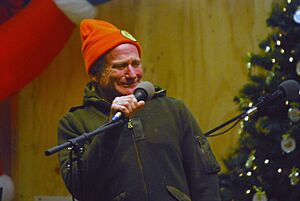
Williams was the host of a talk show for Audible that aired in April 2000 and was only available on Audible's website. In Insomnia (2002), Williams portrayed a murderer on the run from a sleep-deprived Los Angeles police detective (played by Al Pacino) in rural Alaska. Also in 2002, in the psychological thriller One Hour Photo, Williams portrayed an emotionally disturbed photo development technician who becomes obsessed with a family for whom he has developed pictures for a long time. In the 2004 science fiction psychological thriller The Final Cut, Williams played a professional who specializes in editing the memories of unsavory people into uncritical memorials that are played at funerals. His many television appearances included an episode of Whose Line Is It Anyway?, and he starred in an episode of Law & Order: Special Victims Unit. He headlined his own one-man show, Robin Williams: Live on Broadway, which played at the Broadway Theatre in July 2002.
Williams's stand-up work was a consistent thread throughout his career, as seen by the success of his one-man show (and subsequent DVD), Robin Williams: Live on Broadway (2002). In 2004, he was voted 13th on Comedy Central's list of "100 Greatest Stand-ups of All Time". In 2006, Williams was the Surprise Guest at the Nickelodeon Kids' Choice Awards, and appeared on an episode of Extreme Makeover: Home Edition that aired January 30. After a six-year hiatus, in August 2008, Williams announced a new 26-city tour, Weapons of Self-Destruction. The tour began at the end of September 2009, and concluded in New York on December 3, and was the subject of an HBO Special on December 8, 2009.
Years after the films, Janet Hirshenson revealed in an interview that Williams had expressed interest in portraying Rubeus Hagrid in the Harry Potter film series, but was rejected by director Chris Columbus due to the "British-only edict". In 2006, he starred in five movies, including Man of the Year, a political satire, and The Night Listener, a thriller about a radio show host who realizes that a child with whom he has developed a friendship may not exist. Williams continued to provide voices in other animated films, including Robots (2005), the Happy Feet film franchise (2006–2011), and an uncredited vocal performance in Everyone's Hero (2006). He also voiced the holographic character Dr. Know in the live-action film A.I. Artificial Intelligence (2001). He was the voice of The Timekeeper, a former attraction at the Walt Disney World Resort about a time-traveling robot who encounters Jules Verne and brings him to the future.
In 2010, he appeared in a sketch with Robert De Niro on Saturday Night Live, and in 2012, he guest-starred as himself in two FX series, Louie and Wilfred. He made his Broadway acting debut in Rajiv Joseph's Bengal Tiger at the Baghdad Zoo, which opened at the Richard Rodgers Theatre March 31, 2011. For his performance, he was nominated for the Drama League Award for Outstanding Distinguished Performer. In May 2013, CBS started a new series, The Crazy Ones, starring Williams, which was canceled after one season. The Angriest Man in Brooklyn was Williams's last movie to be released while he was alive. Four films starring Williams were released after his death in 2014: Night at the Museum: Secret of the Tomb, A Merry Friggin' Christmas, Boulevard, and Absolutely Anything.
Personal life
Marriages and children
Williams married his first wife, Valerie Velardi, in June 1978, following a live-in relationship with comedian Elayne Boosler. Velardi and Williams met in 1976 while he was working as a bartender at a tavern in San Francisco. Their son, Zachary Pym "Zak" Williams, was born in 1983. Velardi and Williams were divorced in 1988.
While it was reported that Williams began an affair with Zachary's nanny, Marsha Garces, in 1986, Velardi stated in the 2018 documentary, Robin Williams: Come Inside My Mind, that the relationship with Garces began after the two had separated. On April 30, 1989, Williams married Garces, who was six months pregnant with their first child. They had two children, Zelda Rae Williams (b. 1989) and Cody Alan Williams (b. 1991). In March 2008, Garces filed for divorce from Williams, citing irreconcilable differences. Their divorce was finalized in 2010.
Williams married his third wife, graphic designer Susan Schneider, on October 22, 2011, in St. Helena, California. The two lived at their house in Sea Cliff, San Francisco, California. Williams said, "My children give me a great sense of wonder. Just to see them develop into these extraordinary human beings."
Interests
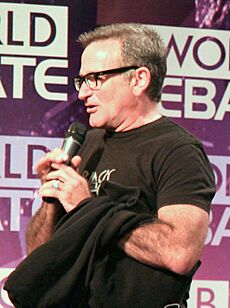
In New York City, Williams was part of the West Side YMCA runners club and showed promising results with 34:21 minutes at a 10K run in Central Park in 1975. His favorite books were the Foundation trilogy by Isaac Asimov, and his favorite book as a child was The Lion, the Witch and the Wardrobe, which he later shared with his children.
Williams was an enthusiast of both pen-and-paper role-playing games and video games. His daughter Zelda was named after the title character from The Legend of Zelda, a family favorite video game series, and he sometimes performed at consumer entertainment trade shows.
Williams was a big fan of anime and collecting figures. His daughter described him as a "figurine hoarder"; one of his figures was the character Deunan Knute from the anime film Appleseed, which he was a fan of. He also liked the film Innocence Ghost in the Shell, and received a DVD copy of Paranoia Agent signed by its director, Satoshi Kon.
He also became a devoted cycling enthusiast. He accumulated a large bicycle collection and became a fan of professional road cycling, often traveling to racing events such as the Tour de France. In 2016, his children donated 87 of his bicycles in support of the Challenged Athletes Foundation and Christopher & Dana Reeve Foundation
Philanthropy
In 1986, Williams teamed up with Whoopi Goldberg and Billy Crystal to found Comic Relief USA. This annual HBO television benefit devoted to the homeless raised $80 million as of 2014[update]. Bob Zmuda, creator of Comic Relief, explains that Williams felt blessed because he came from a wealthy home, but wanted to do something to help those less fortunate. Williams made benefit appearances to support literacy and women's rights, along with appearing at benefits for veterans. He was a regular on the USO circuit, where he traveled to 13 countries and performed to approximately 90,000 troops. After his death, the USO thanked him "for all he did for the men and women of our armed forces".
Williams and his second wife, Marsha, founded a philanthropic organization called the Windfall Foundation to raise money for many charities. In December 1999, he sang in French on the BBC-inspired music video of international celebrities doing a cover of The Rolling Stones single "It's Only Rock 'n Roll (But I Like It)" for the charity Children's Promise.
In response to the 2010 Canterbury earthquake, he donated all proceeds of his Weapons of Self Destruction Christchurch performance to help rebuild the New Zealand city. Half the proceeds were donated to the Red Cross and half to the mayoral building fund. Williams performed with the USO for U.S. troops stationed in Iraq and Afghanistan.
For several years, Williams supported St. Jude Children's Research Hospital.
Death
Williams was found dead in his home in Paradise Cay, California, on August 11, 2014. The final autopsy report noted that Williams had depression and anxiety. An examination of his brain tissue suggested Williams had "diffuse Lewy body dementia". Describing the disease as "the terrorist inside my husband's brain", his widow, Susan Schneider Williams, said that "however you look at it—the presence of Lewy bodies took his life", referring to his previous diagnosis of Parkinson's. She noted "how we as a culture don't have the vocabulary to discuss brain disease in the way we do about depression. Depression is a symptom of LBD and it's not about psychology – it's rooted in neurology. His brain was falling apart." Medical experts struggled to determine a cause, and eventually diagnosed him with Parkinson's disease.
Aftermath and legacy
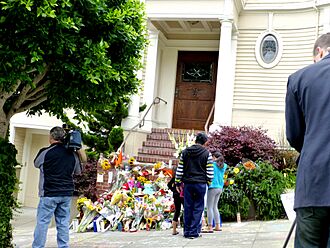
Williams's death instantly became global news. The entertainment world, friends, and fans responded to his death through social and other media outlets. Schneider said, "I lost my husband and my best friend, while the world lost one of its most beloved artists and beautiful human beings. I am utterly heartbroken." His daughter, Zelda Williams, responded to his death by saying that the "world is forever a little darker, less colorful and less full of laughter in his absence".
President Barack Obama released a statement on Williams's death:
Robin Williams was an airman, a doctor, a genie, a nanny, a president, a professor, a bangarang Peter Pan, and everything in between ... He arrived in our lives as an alien—but he ended up touching every element of the human spirit. He made us laugh. He made us cry. He gave his immeasurable talent freely and generously to those who needed it most—from our troops stationed abroad to the marginalized on our own streets.
A tunnel painted with a rainbow on Highway 101, north of the Golden Gate Bridge, was officially named the "Robin Williams Tunnel" on February 29, 2016. In 2017, Sharon Meadow in San Francisco's Golden Gate Park, the home of the annual Comedy Day, was renamed "Robin Williams Meadow".
In 2018, HBO produced a documentary about his life and career. Directed by Marina Zenovich, the film Robin Williams: Come Inside My Mind was also screened at the Sundance Film Festival. That same year, a mural of Robin Williams was created on Market Street in San Francisco. Work on a biography was begun by The New York Times writer David Itzkoff in 2014, and was published in 2018, titled Robin.
In August 2020, Vertical Entertainment released a trailer for a new documentary, Robin's Wish. The film, directed by Tylor Norwood, was released digitally September 1, 2020. In a Netflix special released in May 2022, The Hall: Honoring the Greats of Stand-Up, Williams was inducted into the National Comedy Center in Jamestown, New York.
Influences
Williams credited comedians, including Jonathan Winters, Peter Sellers, Nichols and May, and Lenny Bruce as influences, admiring their ability to attract a more intellectual audience with a higher level of wit. He also liked Jay Leno and Sid Caesar, whose acts he felt were "precious".
Jonathan Winters was his "idol" early in life; Williams, aged eight, first saw him on television and paid him homage in interviews throughout his career. Williams was inspired by Winters's ingenuity, saying "that anything is possible, that anything is funny ... He gave me the idea that it can be free-form, that you can go in and out of things pretty easily."
Acting credits and accolades
Throughout the course of his career Williams won numerous awards, including an Academy Award for Best Supporting Actor for his role in Good Will Hunting (1997). He also won six Golden Globe Awards, including Best Actor—Motion Picture Musical or Comedy for his roles in Good Morning, Vietnam (1987), The Fisher King (1991) and Mrs. Doubtfire (1993), along with the Special Golden Globe Award for Vocal Work in a Motion Picture for his role Genie in Aladdin (1992), and the Golden Globe Cecil B. DeMille Award in 2005. He also received two Primetime Emmy Awards, two Screen Actors Guild Awards, and five Grammy Awards.
Discography
- Reality ... What a Concept (Casablanca, 1979)
- Throbbing Python of Love (Casablanca, 1983)
- A Night at the Met (Columbia, 1986)
- Live 2002 (Columbia, 2002)
- Weapons of Self Destruction (Sony Music, 2009)
Images for kids
-
The Los Angeles Theatre honors Williams on their marquee
-
Star on the Hollywood Walk of Fame
-
Williams's prints at Grauman's Chinese Theatre
See also
 In Spanish: Robin Williams para niños
In Spanish: Robin Williams para niños


